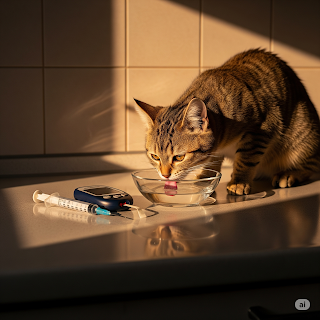Why Is My Cat Always Hungry? 9 Possible Causes and Solutions
A cat that acts ravenous even after eating can be both confusing and concerning for pet owners. While some felines are naturally food-driven, excessive hunger may sometimes indicate underlying health or behavioral issues that require attention. Understanding what drives your cat's constant food-seeking behavior helps determine whether it's normal or warrants a vet visit.
Natural Hunting Instincts at Play
Cats evolved as hunters who eat multiple small meals throughout the day. This explains why your domesticated feline may seem perpetually hungry - their biology expects frequent feeding opportunities. The behavior often appears more pronounced in former strays or cats with food insecurity in their past.
Nutritional Deficiencies in Diet
Low-quality commercial foods packed with carbohydrates and fillers fail to satisfy a cat's biological need for animal protein. As obligate carnivores, cats require meat-rich meals to feel satiated. When their diet lacks proper nutrition, they compensate by begging for more food despite having eaten.
Feeding Schedule Irregularities
Both overfeeding and inconsistent meal times can create problematic eating behaviors. Cats receiving too many treats or large portions learn to expect constant food access, while those on erratic schedules develop food anxiety. Implementing structured, portion-controlled feedings helps regulate their appetite.
Hyperthyroidism's Metabolic Effects
Common in senior cats, hyperthyroidism accelerates metabolism through excessive thyroid hormone production. Affected cats experience insatiable hunger accompanied by weight loss and increased thirst. This condition requires veterinary diagnosis and ongoing management.
Diabetes Disrupting Appetite Signals
Diabetic cats struggle with glucose regulation, leaving them constantly hungry despite eating more. Other telltale signs include weight loss and excessive water consumption. Early detection through blood tests allows for proper treatment with insulin and dietary changes.
Parasites Depleting Nutrients
Intestinal worms and other parasites steal nutrients before a cat's body can absorb them, creating a cycle of hunger no matter how much they eat. Routine deworming and annual fecal exams help prevent and treat these nutrient thieves.
Boredom Manifesting as Hunger
Some cats associate food with entertainment when lacking proper stimulation. Without adequate playtime and environmental enrichment, they may beg for meals simply to relieve boredom. Interactive toys and puzzle feeders provide mental engagement between meals.
Stress-Induced Comfort Eating
Felines often turn to food for comfort during stressful situations like household changes or new pets. Creating a calm environment with vertical spaces and pheromone diffusers can reduce anxiety-related overeating.
Cognitive Decline in Senior Cats
Aging felines with cognitive dysfunction may forget they've eaten and constantly beg for food. This condition, similar to dementia in humans, requires veterinary guidance for proper management and care.
When to Seek Veterinary Care
While some cats simply love food, sudden or extreme increases in appetite demand attention. Combined with symptoms like weight loss, excessive thirst, or digestive issues, it could indicate serious conditions needing prompt diagnosis through bloodwork and exams.
Managing Persistent Hunger
For healthy but food-obsessed cats, solutions include transitioning to high-protein meals, using puzzle feeders to slow eating, establishing strict feeding routines, and limiting treats. These adjustments help satisfy their nutritional needs while curbing problematic begging behaviors.
Understanding your cat's unique needs and potential health factors transforms constant mealtime struggles into manageable routines. For more expert insights on feline nutrition and behavior, visit CatNadoCat.com - your trusted resource for happier, healthier cats.














